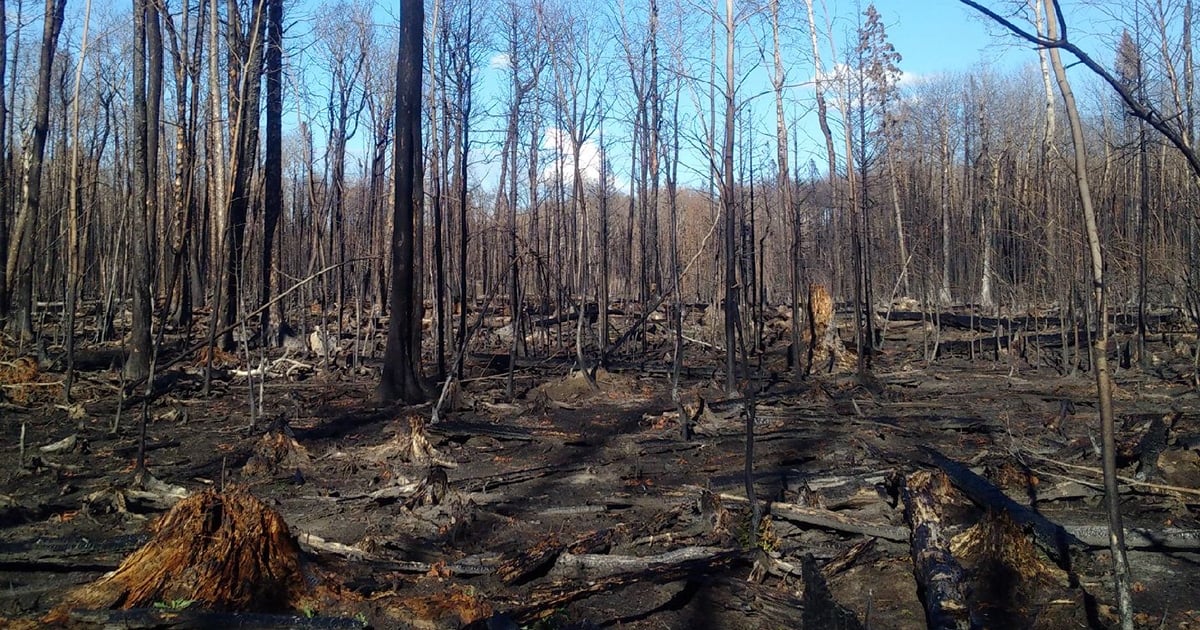The wildfires across Western Canada devastated huge swathes of forest and drove thousands of people from their homes. But as a result, residents from diverse backgrounds united to meet the challenge.
While fires are still burning, the immediate crisis is over and evacuees are now returning to their homes. Saskatchewan Anglican Bishop Michael Hawkins said the most significant aspect of the experience for Saskatchewan and the Anglican Church of Canada was how people rallied together across the province.
“We had fire departments from reserves and cities and villages and towns who united to fight the fires,” said Bishop Hawkins. “It was very moving to see rural, non-Indigenous people fighting fire side by side with their Indigenous neighbours, and I think that has a real potential to make a lasting difference in the province.”
Drawing parallels between the wildfires and other crises facing northern Saskatchewan, Bishop Hawkins urges residents to build on the solidarity engendered through their response to the fires.
“The forest fires are one thing that threatens our homes and communities,” he said. “But we’re also threatened continually by drugs and violence, by suicide and alcohol, racism, poverty, and the like … Whatever’s come out of this crisis and the desire to address that needs to be harnessed for us to work together to fight those fires to protect people.”
The number of wildfires across Saskatchewan remains above average, but is down to about 75 fires compared to 100 at the height of the crisis. Rain brought relief to many affected communities—though southern Saskatchewan recently experienced flooding.
More than 12,000 people in the northern part of the province were evacuated from their homes earlier this summer. A large number of evacuees resided in emergency shelters in communities such as Prince Albert, Saskatoon, Regina and Lloydminster in Saskatchewan and Cold Lake in Alberta.
In Cold Lake, the local Anglican church made an extensive effort to help evacuees, providing bag lunches and other supplies for the seven-hour bus ride back to La Ronge. Meanwhile, members of the Saskatchewan diocese offered extra support.
“We went to visit them to find out how they were doing, just to connect with them,” Diocesan Indigenous Bishop of Missinipi Adam Halkett said.
“It was a time of stress, when people were really getting tired of being there and wanted to get home and wanted to find out how things were at home. But it was still smoky at the time.”
While many evacuees have now gone back to their homes, between 10 and 15 families lost their homes as a result of the fires. The majority were from Montreal Lake, though the neighbouring community of Weyakwin was also affected.
Bishop Halkett, a Montreal Lake resident whose property was damaged, said cleanup of the area was underway.
“We just about lost our house, but we’re grateful that it didn’t happen,” he said. “And we’re grateful for the firefighters that were there to watch the fire and also the homes.”
Throughout the ordeal, Canadian Anglicans offered support for wildfire relief efforts.
Bishop Hawkins estimated that the diocese had received and distributed $35,000 worth of donations, including $15,000 from the Primate’s World Relief and Development Fund and $5,000 from the Anglican Foundation of Canada—both of which went directly to the Prince Albert Grand Council, which has been coordinating relief efforts—and $5,000 from the General Synod of the Anglican Church of Canada.
Funds raised allowed clergy to visit people outside of Prince Albert—taking communion to elders in cities such as Saskatoon and visiting the evacuees in Cold Lake, holding a vacation Bible school in the latter with a team from Crosstalk Ministries in Edmonton.
Funds also provided basic necessities for evacuees. At one point, $1,100 to $1,200 per day were being spent on water due to the heat.
The diocese is now endeavouring to provide $500 worth of support to every family that lost its primary residence to the fires in order to help them with the transition, Bishop Hawkins said.
“We’re glad to be able to share other people’s generosity in helping those families re-build.”
Interested in keeping up-to-date on news, opinion, events and resources from the Anglican Church of Canada? Sign up for our email alerts .

